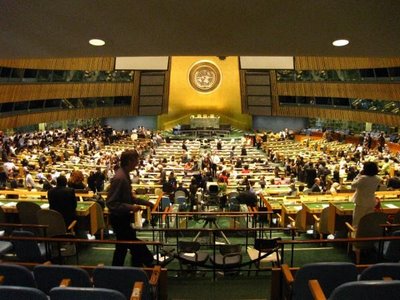Push for Reform, Not Chaos, at the U.N.
The Center for American Progress |
By PARAG KHANNA
Whether or not the Senate ultimately confirms John Bolton as ambassador to the United Nations, the Bush administration's talk of re-engaging with the global organization already rings hollow. Not only did the Bush administration fail to take the lead in reinvigorating the Nuclear Non-Proliferation Treaty (NPT) at last month's negotiations, but it has also been unwilling to do the diplomatic legwork needed to create consensus around Security Council reform, guidelines for international interventions, and a more legitimate human rights council. It takes more than one person to "shake up" the United Nations, as Secretary of State Condoleezza Rice seeks to do. Secretary Rice, along with her special advisor Shirin Tahir-Kheli, must work quickly to restore American credibility at the United Nations by working closely with U.N. Secretary-General Kofi Annan to implement his bold proposals to reform the organization. The Bush administration should resist Congressional efforts, led by House International Relations Committee Chairman Henry Hyde, to bring back the retrograde policy of withholding dues from the United Nations while demanding unrealistic changes. Instead, the Bush administration should work with other countries to imbue Annan with the authority to direct budgets and personnel in order to implement more meritocratic recruitment and promotion practices. By taking real actions to weed out inefficiency, the Bush administration might indeed eradicate ten stories of unnecessary bureaucracy from the Secretariat building. But withholding arrears-as the U.S. did for almost a decade in the 1990s-didn't work then, and it won't work now. Further emasculating the United Nations will not inspire the United States to pick up the slack as the world's policeman. As the continuing genocide in Darfur shows, without the United Nations, the Bush administration would have no one to hide behind in its deplorable inaction. The next step in building genuine cooperation within the United Nations is to update the Peace-Building Commission and the Human Rights Council. Both the State and Defense Departments should be contributing in design and functionality to the Peace-Building Commission, which ultimately mitigates America's own financial burden in the numerous large-scale peacekeeping operations currently underway. As a recent RAND Corporation study shows, the United Nations has a far better track record in cost-effective and durable peace operations. Reform of the Human Rights Council is intimately related to this. If the United States can get more countries on its side in sanctioning odious regimes, it can justify the kinds of humanitarian interventions in Darfur and elsewhere which would restore its long-term credibility rather than undermining it through illegal invasions. The most controversial issue by far this year, however, is Security Council reform, which the United States, China and Russia consistently refuse to touch. Last week, Secretary Rice sought a delay in voting on Security Council expansion until after the United Nations summit in September. Rather than more disingenuous delays, the present deadlock actually represents an opportunity for the United States to push for what it really needs: a more representative and efficient Security Council which would codify a fair division of labor for international security. With key countries also weary of expansion, the United States can push European Union members to consolidate their multiple seats on the Security Council, opening up space for underrepresented regional groupings such as the African Union, which has already begun to take greater responsibility for the continent's security while major powers hesitate. No matter how the Security Council is finally constituted, greater restraint in usage of the veto by the Permanent 5 members may be the most promising Security Council reform, including refraining from vetoing unless direct national interests are at stake, or potentially requiring multiple vetoes. Taking the first step would give America's sagging moral authority an enormous boost. The United Nations is very much a broken organization, but is not beyond repair. The Bush administration will have to demonstrate real political stamina if it wishes to lead the process towards a favorable outcome rather than a diplomatic wreck that it could have prevented-but it is worth it.